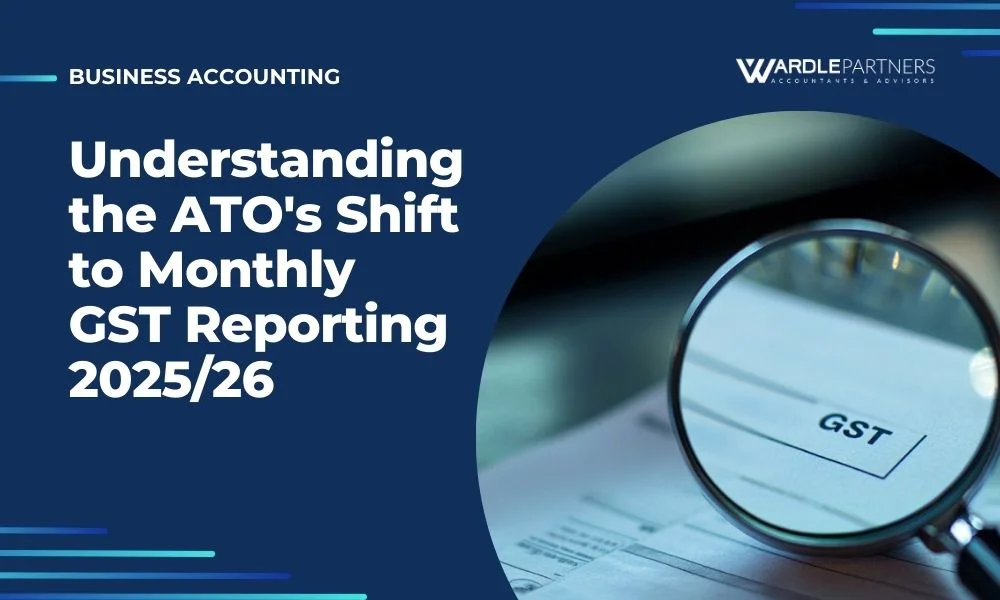The Australian Taxation Office (ATO) has announced that starting 1 April 2025, approximately 3,500 small businesses with a history of non-compliance will transition from quarterly to monthly Goods and Services Tax (GST) reporting to enhance tax compliance. This initiative aims to improve the monitoring of GST obligations and ensure timely tax payments.
Behind ATO’s Decision
The ATO’s move to force monthly GST reporting is no accident. It directly addresses non‑compliance issues such as late payments, non‑lodgement, and incorrect reporting, helping to ensure businesses stay on top of their obligations. Moreover, by increasing reporting frequency, the ATO expects to foster better financial discipline among affected businesses.
Furthermore, monthly reporting offers substantial benefits. For instance, it allows businesses to manage cash flow better by breaking payments into smaller, more manageable amounts. It also enables quicker detection and correction of any errors, thus reducing the risk of costly compliance breaches. Transitioning to more frequent reporting can also improve a business’s reputation with the ATO, potentially avoiding further scrutiny or penalties.
ATO’s Communication
From March 2025, the ATO will begin notifying small businesses with a history of non-compliance about their transition to monthly GST reporting, which will take effect from 1 April 2025. This applies to companies that have failed to respond to previous ATO communications and have demonstrated a poor compliance record, such as:
- Consistently paying GST late or failing to pay the full amount due.
- Failing to lodge BAS on time or not lodging at all.
- Incorrectly reporting tax obligations.
Businesses selected for this change will receive official written notification from the ATO confirming their move to monthly GST reporting.
Implications for Affected Small Businesses
For businesses identified for this change, the shift to monthly GST reporting means:
- Increased Reporting Frequency: Businesses will need to prepare and submit their Business Activity Statements (BAS) monthly instead of quarterly.
- Cash Flow Management: More frequent GST payments may impact cash flow, necessitating more meticulous financial planning.
- Compliance Monitoring: The ATO will closely monitor these businesses to ensure adherence to the new reporting requirements. It’s essential for affected businesses to adapt promptly to these changes to avoid potential penalties.
- Fewer Tax Surprises – With monthly reporting, errors and discrepancies are identified sooner, making it easier to correct mistakes before they become costly problems.

Steps to Transition Smoothly to Monthly Reporting
To ensure a seamless transition to monthly GST reporting, small businesses should consider the following steps:
- Review Current Compliance Status: Assess your current GST reporting and payment practices to identify areas needing improvement.
- Update Accounting Systems: Ensure your accounting software is configured for monthly reporting to facilitate accurate and timely BAS lodgment.
- Train Staff: Educate your finance team about the new reporting requirements to ensure compliance.
- Consult Professionals: Seek advice from tax professionals or accountants to navigate the transition effectively.
Proactive measures will help mitigate challenges associated with the increased reporting frequency.
In addition, businesses should mark the calendar for deadlines and set reminders each month. By proactively planning, you’ll reduce last‑minute stress and help avoid fines due to late lodgement. Ultimately, while this regulatory change may feel daunting at first, it can be transformative for long‑term GST accuracy and business health.
Potential Benefits of Monthly GST Reporting
While the shift may seem daunting, there are potential benefits to monthly GST reporting:
- Improved Financial Oversight: Regular reporting can lead to better financial management and decision-making.
- Timely Error Detection: More frequent reporting allows for quicker identification and correction of errors.
- Enhanced Compliance Reputation: Adhering to monthly reporting can improve your business’s standing with the ATO.
Embracing the change can lead to long-term advantages for your business.
Seeking Assistance and Resources
If your business is affected by this change, then it’s crucial to utilise available resources:
- ATO Support: The ATO offers guidance and support for businesses transitioning to monthly reporting.
- Professional Advice: Engage with tax professionals to receive tailored advice for your business.
- Educational Materials: Access workshops and online materials to stay informed about compliance requirements.
Leveraging these resources can facilitate a smoother transition.
Conclusion
The ATO’s mandate for monthly GST reporting for non-compliant small businesses underscores the importance of timely and accurate tax practices. Understanding the implications and proactively adapting to the changes can help businesses comply with regulations, and enhance their financial management. It’s an opportunity to reassess and improve your business’s compliance strategies for sustained success.
Ensure your business is prepared for the upcoming changes. Consult with Wardle Partners Accountants & Advisors team today to navigate the transition to monthly GST reporting seamlessly.









